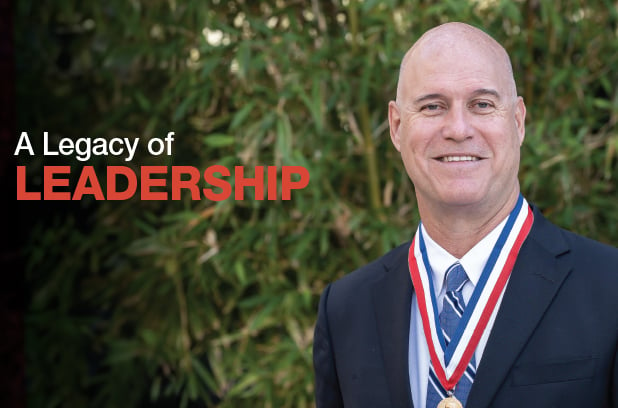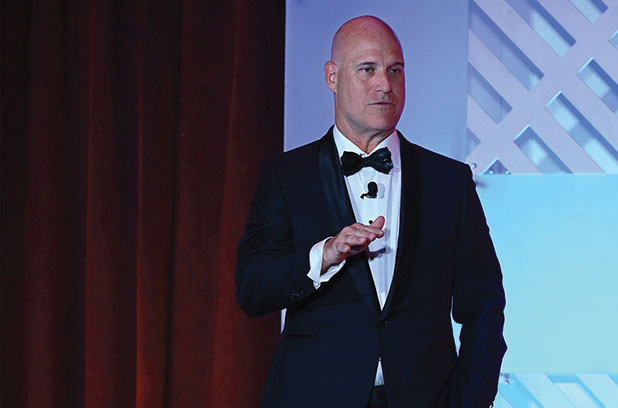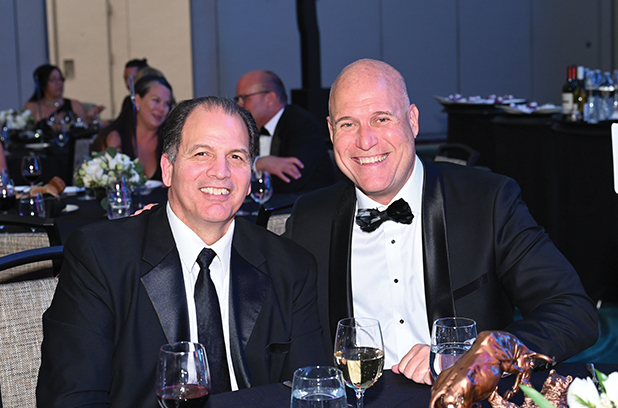A Legacy of Leadership
For a career of firsts in areas like technology and sustainability, as well as unlocking the potential of a family tree of executives, Tony Milikin, MBA, is honored with the 2024 J. Shipman Gold Medal Award.

For Tony Milikin, MBA, perhaps the most potent supply management superpower is the ability to survey a situation, see through the fog and focus on the colors and contours of the landscape.
“It’s like one of those Marvel movie characters,” says Milikin, chief supply chain officer at Athletic Greens, a global health and supplement company. “Those freaks have certain skills.”
Such expertise applies not only on how to look, but also where. In Milikin’s nearly four decades in supply management, that has included changing the bidding process on U.S. Department of Defense (DoD) contracts, being a reverse auctions forerunner, and integrating sustainability and circularity into procurement, among other territory that had been largely uncharted. Along the way, his macro approach helped spotlight how sound procurement strategies, particularly in negotiation, can impact working capital and gross margins.
And with a long line of protégés — including more than 40 C-suite executives — behind him, Milikin’s most recent trail was blazed to his profession’s highest honor. He is the 2024 winner of the J. Shipman Gold Medal Award, presented by Institute for Supply Management® (ISM®) for career achievement.
“This is 100 percent about legacy,” says Milikin, the 93rd recipient of the Shipman Award who was honored in May at ISM World 2024, the Annual Conference in Las Vegas. “It’s about leadership and developing people. I’m a servant leader, meaning that I want my team to take risks. When they’re successful, they get the credit. And if they fail, they know I am ready and willing to take the arrows.
“If employees know someone has their backs, it unlocks their potential.”
Milikin says he was honored and humbled by the Shipman selection, but not surprised. His nominator was Anthony Nieves, CPSM, C.P.M., A.P.P., CFPM, who recently stepped down after a lengthy tenure as Chair of the ISM Services Business Survey Committee and received the Shipman Award in 2010. “Tony’s opinion carries a lot of weight,” Milikin says.
However, the most compelling evidence is Milikin’s resume, which features significant bottom-line impacts at some of the world’s most iconic brands, the result of a constant focus on finance metrics and unapologetic mission to get the best product at the best price.
In his nomination form, Nieves wrote that Milikin has exemplified procurement aligning with overall company goals, including that the CPO and finance function “should be in lockstep to drive shareholder wealth.”
He added, “Tony continues to sharpen his business philosophy to drive sustainable results by improving gross margins by price and productivity, lowering overheads, increasing working capital by (more favorable) payment terms, lowering inventories and eliminating waste.”
Making an Impact on the ‘Bigger Numbers’
His career timeline began as a procurement supervisor at LTV Aerospace and Defense (A&D) in 1986, and Milikin was innovating out of the starting blocks. One of his first tasks after a reassignment from the A&D division to procurement was to place bids using the DoD’s byzantine process, a time-intensive effort that Milikin streamlined and simplified using an IBM XT computer and Lotus 1-2-3 spreadsheets.
“Back in the day, the DoD required three bids on everything,” he says. “Even if there weren’t three prospective suppliers, you had to figure it out. I loaded the information into Lotus and it did the analysis. I was kicking out 100 POs a day while my peers were doing maybe 10.”
The experience piqued his interest in the supply chain, as well as fostered a philosophy that has governed his decision-making since: “There are really two elements of the supply chain: price and performance,” Milikin says.
“Performance is the manufacturing or converting of raw materials into a finished product; the price is all the stuff that goes into it. I found that the quickest way you can impact a company is on the price side, not on the performance side. In performance, you’re usually looking at pennies, nickels or dimes. On the price side, it’s dollar bills — $5, $20, $100. I was always attracted to the bigger numbers.”
His career has featured roles at MWV and Keurig Dr Pepper, but the centerpiece of Milikin’s resume is more than 12 years as CPO and chief sustainability and circular ventures officer at Anheuser- Busch InBev (AB InBev). There, he was a sustainability integration pioneer, facilitated multiple circular waste startups, helped launch the 100+ Accelerator and was responsible for US$35 billion in sourcing.
In dealing with suppliers, Milikin’s great commandment is to get the highest quality for the lowest price, never sacrificing the former for the latter. “When it comes to supplier relationship management, there are two camps,” Milikin says. “And I know I’m in the minority.”
He acknowledges that could be interpreted as ruthless, and that he’s an outlier regarding today’s general sentiment that supplier negotiations should be a win-win. But that’s usually not in alignment with a company’s financial goals, he says.
“I’m employed by my company, not by suppliers,” he says. “My shareholders don’t care if I have friends. They care that that my team delivers earnings per share. … My job is to make sure we extract every penny possible out of the cost of goods and improve cash flow. I define a win-win as 90-10, not 50-50, and if you think that 10 percent was a win for you, great.”
John Blascovich, MBA, CPSM, C.P.M., the 2023 Shipman Award winner and partner in Kearney’s procurement practice, says Milikin is tough but fair.
“Tony is aggressive, and he’ll use every tool available to him,” Blascovich says. “He’s always looking to get the most for his company out of any interaction. That doesn’t preclude the other side from doing well. He’s not going to turn down a win-win, but he’s not going to allow what we call a false partnership.”
He elaborates, “A supplier might say they’re a partner, but they don’t act like a partner or share information. That kind of supplier will find it hard to work with Tony. He can be hard, but he’s worked in competitive industries. And he’s going to protect his company.”
Innovative Sourcing and Sustainability
One of the more effective tools as Milikin’s disposal is a reverse auction, in which a company requests a good or service and invites businesses to compete for the contract by bidding the lowest price. Reverse auctions remove the psychology and potential distrust of a negotiation, Milikin says, because the only competition is between prospective suppliers.
“As a supplier, your competition is setting the price,” he says. “It’s a survival of the fittest, meaning the best suppliers with the most competitive bid will get the job.”
In a negotiation, a prepared procurement organization is aware of a potential supplier’s financial health and fixed-cost tolerance. But a reverse auction can surprise in that regard, Milikin explains: “If a supplier really wants your business, they might actually bid a ridiculously low price because they can take the fixed cost, spread it out and they still come out ahead if your business is on board. You never know what motivates suppliers and what they will do. That’s why I’m one of the strongest advocates of reverse auctions.”
Milikin’s advocacy has perhaps been most important in sustainability. He was the first combined CPO and chief sustainability officer, and his leadership after taking that role at AB InBev in 2014 helped result in the company touting its sustainability successes in a notable commercial during the Super Bowl in 2019. The 60-second spot, set to Bob Dylan’s “Blowin’ in the Wind,” features the Budweiser Clydesdales riding past wind turbines.
“We did everything on sustainability by looking at the benefit from a cost standpoint. That was first,” Milikin says. “Secondly, how does sustainable procurement help the brand? So, we were working with marketing, saying, ‘Hey, these are some pretty neat things we’re doing,’ and other people in the company wanted to be part of it. It kind of snowballed, and nobody would’ve ever thought renewable electricity would be a Budweiser commercial for the Super Bowl.”
AB InBev has committed to making every bottle of its beers using renewable energy by next year. In its packaging, the company uses recycled aluminum and glass and has cut plastic use. The 100+ Accelerator, a program designed to speed the growth of sustainability- focused startups, was launched by AB InBev in 2018; Coca-Cola, Colgate- Palmolive, Danone and Unilever have since joined as co-sponsors.
In directing sustainability at AB InBev, Milikin stressed to executives that the initiative was about much more than global citizenship. It was also smart, profitable business.
“Renewable energy has saved the company tens of millions of dollars,” says Milikin, who left AB InBev in 2021. “And when I was there, we did not take one penny from capital expenditures to do it. … I couldn’t be prouder of what that team did. I can’t say it’s mine because I haven’t been there for three years, but for the procurement team, that opportunity to work on sustainability like that was a gift.”
Preparing the Next Generation
His success in embracing such innovations as reverse auctions and bringing sustainability into sourcing has made Milikin a leader in transitioning procurement from baby boomers to the next generations, able to easily relate to young professionals and how they work.
Milikin’s leadership is based on communication. He encourages employees to speak freely, but with the awareness that it’s a two-way street.
“He’s never been afraid to put things in straightforward terms,” says Blascovich, who served with Milikin on ISM’s Board of Directors in the 2000s. “When issues came up on the Board, he stood by his principles and was firm about what he felt was the right thing to do — always respectful, but he wasn’t going to deviate just to be nice.
“Tony wanted everyone on the same page. You see the same thing at his companies, with the way he team builds and is open to innovation. He’s not going to try to get something at any cost. It’s got to be the right answer for the situation.”
Milikin has brought answers and embraced the possibilities since joining Athletic Greens in September 2023. The company launched 14 years ago; its signature product is a daily supplement powder called AG1.
“Everything we do is ‘asset light,’ which is a strong point for me because it’s all about sourcing,” he says. “I get to run the whole supply chain and sit with the founder and CEO (Chris Ashenden) and COO and president (Kat Cole) and run this business. And Athletic Greens is at the start of something very big.”
In only a year at the company, Milikin has mentored young professionals who figure to someday join his family tree of C-suite members. He cited several standouts, who already possess the “freak skills” of seeing through the fog and surveying the supply chain terrain.
“Seeing some of the people coming up though procurement now, a part of me wishes I was 20 years younger,” Milikin says. “It would be a nice opportunity to spend a few more years in the profession. But it will be fun to watch from the sidelines.”




